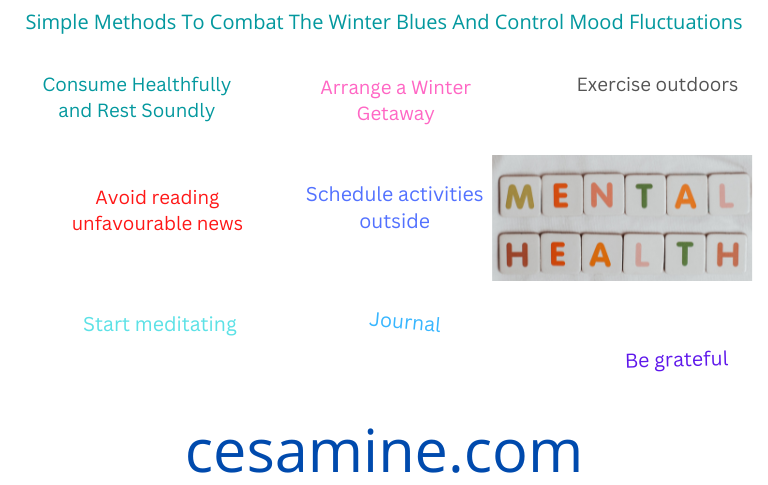Simple Methods To Combat The Winter Blues And Control Mood Fluctuations
Laziness is encouraged by the winter blues; instead of venturing out and seeing new places, individuals choose to stay in bed and binge-watch their favourite shows. Experts offer simple suggestions for winter mood management and self-recharge.
We tend to spend more time indoors wrapped in blankets binge-watching movies or simply addicted to our devices as the days become shorter and the winter chill sets in. Our mental health may deteriorate as our level of activity decreases.
If you experience winter depression on a regular basis, your lifestyle choices or poor winter preparation may be to blame. Some people may also have mood disorders like SAD (Seasonal Affective Disorder), a kind of sadness, which can worsen their bad mood during the day.
By making a few minor adjustments to your routine and including more physical activity and a healthy diet, you can better manage your mental health throughout the colder months.
It’s the end of the year. The sun is setting earlier and the temperature is dropping daily. The lack of sunlight at this time of year frequently has an adverse effect on both physical and mental health.
We notice that we are more easily irritated, have less energy, or even struggle to complete our daily tasks. For our total health and welfare, it is essential to maintain our mental health throughout these winter months, according to Dr. Jyoti Kapoor, founder and senior psychiatrist of Manasthali.
Seasonal Affective Disorder: What Is It?
Wintertime is when many people experience seasonal affective disorder (SAD), a form of depression. Lack of energy, excessive napping, sluggishness, losing interest in daily activities, or a lack of enthusiasm to do anything are examples of symptoms.
According to Dr. RC Jiloha, Senior Consultant – Psychiatry, Paras Hospitals, Gurugram, “winter blues attract lethargy; many choose to stay in bed and binge-watch their favourite shows while consuming junk instead of getting out and experiencing locations.
Here are some professional advice for overcoming the winter blues and controlling those unpleasant emotions:

1. Exercise outdoors
Daily exercise benefits our bodies and minds. Even only 15 to 30 minutes of moderate exercise each day can help us feel more energised, sleep better, more confident, and happier.
“We shouldn’t stay indoors just because it’s cold outside. Dress warmly and in layers, then step outside for a stroll to get some fresh air and the vitamin D you need. Exercise promotes relaxation and stress reduction.
Even in the cold, being outside in the daylight lifts one’s spirits. There are several of possibilities for at-home workouts even if you can’t go outside. Check out online classes to enrol in or videos to follow along with. You might even discover that these sessions provide a means to socialise while getting physical advantages, says Dr. Kapoor.
2. Consume Healthfully and Rest Soundly
“A key element of keeping a healthy and positive lifestyle is eating a balanced diet. Processed food and refined sugar diets have been linked to depression and other mood disorders getting worse.
Focus on maintaining balance by filling up on nutritious fruits, veggies, and proteins while allowing yourself the occasional indulgence, advises Dr. Kapoor. This may be difficult with all the leftover holiday dishes and desserts.
3. Arrange a Winter Getaway
“The easiest way to reduce anxiety is to take a winter vacation. Snowfall and a change in environment significantly alter the atmosphere of the darker days. In addition, many trekking excursions, extreme sports, and mountain exploration excursions are planned.
The first step to getting out of your depressing thoughts in whatever season is keeping in touch with your loved ones and making the decision to look after your mental health.
Get professional assistance, nevertheless, if you believe your condition is becoming too complicated and affecting your personal life. Let a therapist comprehend your problems and offer you the best course of action, advises Dr. Jiloha.
4. Create a programme for your day
“Make a proper schedule to keep your energy level throughout the day, incorporating some regular physical activities like brisk walking or yoga without being constrained by early morning timing,” advises.
Clinical psychologist Dr. Shweta Sharma is the founder of the Mansa Global Foundation for Mental Health.
5. Avoid reading unfavourable news.
“If the news is making you feel down, only watch it for 15 minutes before switching to something more upbeat, like a TV show, sports, or a movie you like. Scrolling through social media apps had the same effect. Limit your time and switch to a new, more fulfilling hobby, advises Dr. Kapoor.
6. Be grateful
Practice gratitude “Keeping a gratitude journal can dramatically improve your mood and broaden your perspective, even if it only only five minutes every day. Write down at least one thing for which you are grateful each day, advises Dr. Kapoor, and do so at the end of the day.
7. Start meditating
“Meditation is a very healthy habit, even if only for five to ten minutes a day and brings about a significant impact in your health,” says Dr. Ayurveda. Dr. Kapoor says that once a day, in the morning or before night, meditation helps keep you grounded and calm your thoughts.
8. Schedule activities outside
Plan some outdoor activities each week to offer yourself new mental energy because staying put or sticking to the same schedule won’t motivate you enough, advises Dr. Sharma.
9. Journal
Keep a thankfulness book, advises Dr. Sharma, to remind yourself “how significant you are as an individual” or to recognise your value.